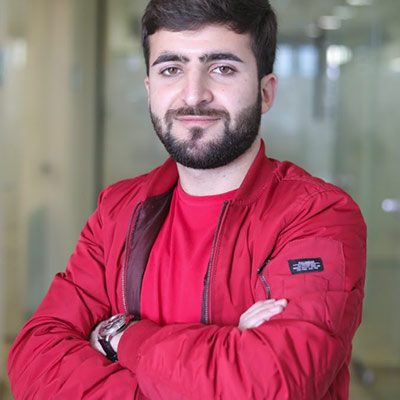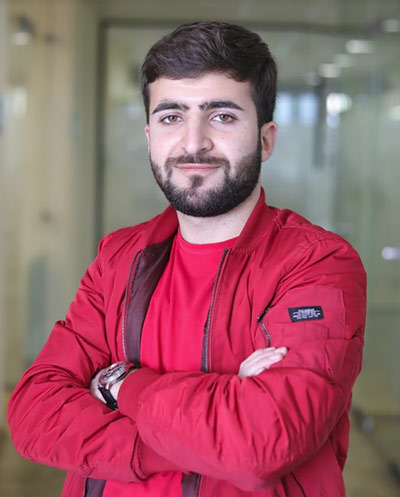
 “My friends in the army were not afraid to die, but they were worried about their families,” said AUA student and veteran Ara Nikoghosyan. “I have seen parents who lost their children and I couldn’t imagine my mother and father in that painful situation.”
“My friends in the army were not afraid to die, but they were worried about their families,” said AUA student and veteran Ara Nikoghosyan. “I have seen parents who lost their children and I couldn’t imagine my mother and father in that painful situation.”
A native of Vedi in the Ararat region, Ara was trained as a tank shooter and served in the four-day war in April 2016. When the alarm sounded on that fateful day that notified Azeri attacks, he and his fellow soldiers took their rifles and equipment and ran to the tanks.
“As we passed through the villages in Artsakh on the way to Martakert, we saw old people and children in tears,” said Ara, who is studying Business at AUA. “We realized that we were their only hope.”
He lived through the tragic experience but doesn’t feel he has fully recovered from the trauma. But AUA helped Ara readjust to society and focus on his education. Once he returned to campus, he felt motivated and prepared for his studies, becoming fully engrossed in his courses and the motivating words of his professors. Ara appreciates the quality of education at AUA and its high standards.
“I’m so thankful to AUA and the donors who supported my education,” said Ara. “Their belief in me will play a vital role in my future career.”
Ara plans to work on a startup business after graduation and do his share to strengthen and create a bright future for Armenia.
“A country with such an old civilization and a rich cultural heritage with so many talented, hospitable, warm and strong-spirited people has no other choice but to prosper,” said Ara. “The country needs a healthier economy and I am determined to one day become an economic pillar of Armenia.”
Ara Nikoghosyan is from Vedi, Ararat region.He joined the armed forces in 24 January 2015. The first 5 months he had spent in Armavir, as he was being prepared to become a tank shooter. The first months were the most difficult, as he had to adapt to the new conditions and lifestyle. After that, Ara was transferred to Sotk, Gegharkunik, which is a couple of kilometers away from Qarvachar, Artsakh. He had never thought about war before, and it seemed to be way far from reality, as there were no risks visible from the first sight. He remembers when he and a couple of friends were talking about their duties in case of war, and it was stressing even to think about it. They were not afraid to die, they worried about families, because their lives belong to closest people, but not themselves. He had seen parents that lost their children, and it was painful to imagine his parents in that awful situation.When the alarm sounded, he thought it was one of the educational alarms, which used to train their alertness. As usual, they took rifles and equipment, and ran to the tanks, thinking that it would last for only an hour, and they would return to their daily routine. However, later they were told that the azeris attacked all along the borderline, they heard about our victims and loses, heard about the deaths of their co-servers, and then realized that everything was very serious, and the alert was real. They did not panic at all, but felt very sorry and responsible for every new victim or wounded, and just desired to get there as soon as possible.
Ara recalls,” Our tanks had to be moved to the borderline, however, we had no time to wait for the trailers to arrive, so we had to drive 130 kilometers to get to Martakert. When passing near villages in Artsakh, we saw old people and children in tears, and we deeply realized that we were their only hope. We got to Martakert on the 3rd of April”.
“For a few days we had to prepare our tanks and guns for battles, and we were staying in a relatively peaceful location for that purpose. After the preparations, we moved to the borderline to defend the second line. The first few days were quiet. However, somewhere around the 20th, the heavy artillery of the enemy started to shoot on us. We did not have the right to shoot, so we just had to wait there until our commanders ordered us. It was a miracle of God that we did not get wounded of a projectile, which fell only 10 meters away, but did not burst. A sniper bullet passed between the heads of mine and my friend’s, and it was so close (5-10 centimeters away)”.
“Usually, tanks are the most visible targets in the battlefield, and it is almost impossible to return from there. Our mindsets had been changed: they were thinking that we would die anyways, so why not to take some enemies with us. We were not even thinking about returning to our military unit in Sotk. It seemed even impossible to return home from the army. In one word, we had become suicide bombers for the enemies”.
They returned to Sotk only in June, and there were only 7 months left till the end of the service. He cannot say that he is fully recovered from the negative he had lived for those months. Very often Ara remembers those days, and it feels like it was not him, but another person. It took months to believe that everything is over. He remembers when he took a vacation for a few days and came to Yerevan: every light he saw that was far above him, he thought them to be self-destructing drones (they call it Kamikadze), and always panicked in the first few seconds seeing them. Every time someone slammed a door loudly, he jumped up from his place as those kind of sounds reminded explosions. AUA is a whole another world for Ara . He had studied at AUA for a semester, then joined the army. He was so impressed by every single detail in AUA, that was impatient to end the service and come back to his classes. Ara was missing his university very much. The fact that he would continue studies at AUA, always motivated him to be more serious about education, as not everyone has a chance to study here. The months after returning from war, were the last ones and were very challenging for him. As he knew that he would return to his studies, he acknowledged that had to train his mind and prepare for the studies, so he started to read books. When he returned, he was motivated enough to continue studies, but thoughts and memories about the army and war did not let him free. His body was here, however half of his mind remained somewhere far from Yerevan. AUA helped his mind to come back, as the environment always reminds where you are, who you are and why you are here.
He was fully engrossed in classes and the motivating words of professors and friends helped him to fully recover from memories of war. Apart from so many hardships experienced he truly believed everything in this for is for some reason and the impact the Army days had on the formation of his personality was indeed great. He has changed a lot, and, fortunately for the better.
AUA helped Ara to understand what he wants to achieve in future career. First of all, in AUA he realized the importance of a quality education. Education is, undoubtedly a strong asset and as Mandela stated “Education is a strong weapon which you can use to change the world”. And this is so true. This is the asset that helps you dream big and make bigger plans. So, education in AUA helped to make bigger and brighter plans for his future. AUA has also changed Ara personally, he became more responsible and result oriented, begun thinking broader, views have become more “democratic”. It’s a great responsibility for him to be a part of AUA. It’s an institution with high standards and its own educational traditions, so, in no way, does he have the right to neglect them. Ara is very thankful to AUA and people who supported his education because this is due to their support and care that he is getting a quality education that will undoubtedly play a vital role in future career. Besides, the example of such kind of people motivates him to become one who could show support and care to people and make a difference in somebody’s life.
In near future Ara would like to become a professional in his sphere, one who could bring benefit to any company he works. Anyhow, he would like to work on his own startup and make small, still decisive steps in business.
He believes that his home Country-Armenia, has a bright future. A country with such an old civilization and such a rich cultural heritage with so many talented, hospitable, warm and strong-spirited people has no other way but to prosper. And he as an Armenian and a patriot have a great desire to have his own contribution in the development of his country. Today Armenia needs a strong economy and he is determined to be one of those who will build the strong Economic pillar in Armenia.
